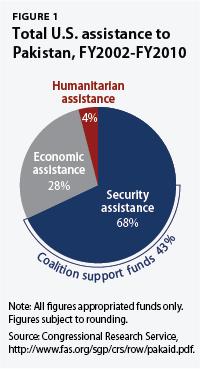Download this issue brief (pdf)
Washington, D.C.—The U.S. decision to defer nearly $800 million in counterterrorism funding to Pakistan in recent weeks was a necessary step, given the ejection of U.S. military trainers from Pakistan, ongoing concerns over the misuse of U.S. aid dollars, and mounting evidence of Pakistani complicity with insurgent groups. Today, the Center for American Progress has released “The Limits of U.S. Assistance to Pakistan,” offering a more comprehensive review of all aid to Pakistan, weighing the costs and benefits of our assistance in order to determine the best aid package for advancing U.S. security interests in Pakistan and the broader region.
Since 9/11, American policymakers have significantly increased military and nonmilitary assistance to Pakistan in an attempt to expand our otherwise limited leverage on a broad range of strategic concerns as well as to support Pakistan’s nascent democracy, but the effectiveness of this new assistance remains in doubt. The United States has been unable to allocate the assistance as quickly as hoped due in part to the Pakistani government’s weak planning capabilities, the U.S. government’s own bureaucratic failings, the lack of absorption capacity among Pakistan’s nongovernmental implementing partners, and the difficulty in finding local accounting firms to oversee monitoring and evaluation.
Prior to the passage of the Enhanced Partnership with Pakistan Act of 2009, an attempt to expand this bilateral aid relationship beyond an almost-exclusive focus on military assistance between fiscal years 2002 and 2008, nearly three-quarters of all money going to Pakistan was security aid, the bulk of which was disbursed in the form of “Coalition Support Funds,” intended to reimburse Pakistan for military operations conducted against militant groups along its border. Unfortunately, the Pakistani military budget does not list these funds as a source of revenue, nor do they disclose how they are spent.

The way the overall U.S. assistance package to Pakistan is structured—with the overwhelming balance of it paid in the form of Coalition Support Fund reimbursements for claims made after the fact that cannot be directly audited by either the United States or the Pakistani civilian government—actively encourages and fosters corruption, mismanagement, and waste, rather than making it less likely.
Given that Pakistan’s internal stability is deteriorating, with economic, security, and political crises, U.S. policymakers need to conduct a broader systemic assessment of its bilateral assistance to Pakistan. This issue brief recommends ways to streamline aid to Pakistan while making it more effective, including:
- Conduct an audit of all U.S. assistance to Pakistan
- Increase oversight and transparency of all assistance
- Elevate nonmilitary assistance, making it more sustainable and effective
Ultimately, the Pakistani government must become a genuine partner for our military and nonmilitary assistance to succeed. U.S. policymakers cannot fix Pakistan by itself, but they can better utilize U.S. assistance to support Pakistan as it struggles to resolve a number of competing crises by reviewing and refocusing our aid to ensure it has the greatest chance of contributing to the creation of a self-sustaining Pakistani state able to take responsibility for its own internal challenges and be a constructive partner within the broader region.
Download this issue brief (pdf)
To speak with CAP experts, please contact Christina DiPasquale at 202-481-8181 or [email protected].
###